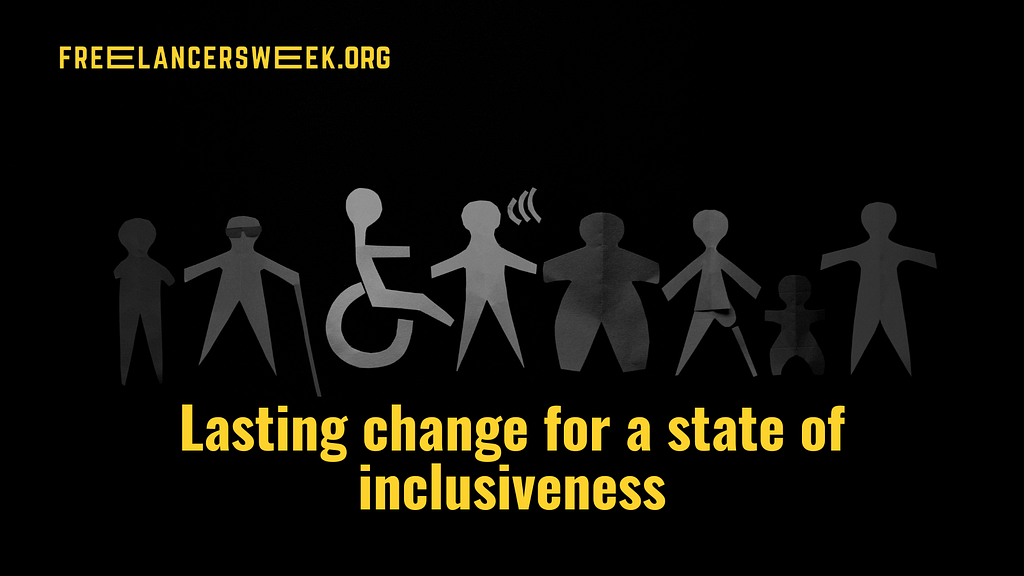In today’s job market, freelancing has become a popular choice. As a freelancer, one of the necessary aspects of your journey is getting paid for your skills and services.
Whether you are a new or veteran freelancer, fair pay can be a challenge. The value of your work may vary on a variety of factors but there are some essential steps that you can carry out!
#EFWeek helps freelancers address challenges by promoting value understanding and transparent rate setting for organisations.
Your worth as a freelancer
As a freelancer, it is important to recognise and appreciate the value of experience. Take the time to really think about the specialised knowledge you bring to the table. Consider your qualifications and the impact your work can have on clients’ businesses. By understanding your value, you will be better equipped to advocate for fair pay.
Price does not exist in a vacuum: the important issue for your clients is the price: value ratio. If the price is high, but the value to the client is 5x that high, then….the price doesn’t seem that high any more.
A good starting point is identifying your core strengths and areas of expertise. Reflect on the skills and knowledge that set you apart from others in your field. Consider what you excel at and what makes you valuable to clients. Are you a talented designer with a keen eye for detail? Are you a skilled writer who can convey complex ideas in a compelling manner?
Recognising these strengths will enable you to articulate your value more clearly during negotiations.
From here you can go further by taking stock of your past successful projects. Consider the impact of your work on previous clients or employers. Did you help a company increase its revenue through your marketing strategies? Did you create a website that improved user engagement and conversions? Reflecting on these accomplishments will provide evidence about the value you bring. To further understand your worth and value, think about your qualifications and certifications. Take stock of your educational background and specialised training relevant to your field.
These credentials confirm your expertise and show your professional development. Clients are often willing to pay more for freelancers that can deliver outstanding results.
Another point to consider is your years of experience. Check the number of years you have spent gaining practical knowledge in your field. Consider the lessons learned from past projects and the growth you have achieved. Your experience influences your problem-solving skills, which can impact client projects’ end results.
A final point is to consider the impact your work can have on clients’ businesses. How does your expertise contribute to their success? Can you help them save time or boost their bottom line? Discussing the benefits of your services for clients can justify fair pay for your services.
Market research
Market research is an important step in determining fair pay as a freelancer. Explore the industry you operate in to gain insights into varied pricing structures. Look for resources such as industry reports and networks to gather relevant information. It is important to understand the market to set expectations and make an informed offer.
For freelancers, conducting market research is a necessity for many reasons, such as:
Understanding industry standards
Every industry has its own unique standards and pricing practices. Market research helps you grasp what other freelancers charge for their services. This information provides a benchmark to assess the fairness of your own rates. It enables you to align your pricing with industry standards, while staying competitive.
Identifying regional differences
Market research helps you recognise regional variations in pricing. Rates for freelancers can differ based on location, cost of living and market demands. By understanding these differences, you can adjust your pricing to the market demands. This ensures that you are maintaining fairness for both you and your clients.
Leveraging platforms and networks
Freelance platforms and professional networks provide valuable resources for conducting market research. Explore different platforms and review the profiles of other freelancers offering similar services. Pay attention to their experience, and the feedback they have received from clients. Additionally, engage with networks to seek insights and advice from experienced freelancers. These platforms and networks offer information that can inform your pricing strategy.
Analysing industry reports and surveys
Industry reports and surveys provide insight on market trends and client expectations. They offer a perspective into the factors influencing pricing decisions, such as deliverables. Stay updated on the latest industry reports to gain an insight of the market and adjust your rates.
Consider your unique value proposition
While market research is essential, you also should consider your unique value proposition. Take into account factors that make you different from other freelancers. For example, take into account your specialised expertise, extra services, or exceptional quality. If you offer a unique skill set, you may be able to justify charging higher rates than the average market benchmarks.
By conducting market research, you position yourself as an informed and professional freelancer. This knowledge equips you with the information needed to set fair rates and negotiate with clients.
Developing effective negotiation skills
Negotiation is an essential skill for freelancers seeking fair pay. Begin by establishing clear objectives and understanding your desired pay range based on your skills and market research. When negotiating, focus on the unique value you bring to clients. Highlighting this value allows you to showcase the impact you can have on their business.
Practise active listening, confidence, and be willing to negotiate beneficial terms. Remember, effective negotiation is a two-way process that aims for a fair outcome.
Developing negotiation skills is best done through real-life experiences. Reflect on past negotiations, both successful and unsuccessful, and identify areas for improvement. Look back on negotiation encounters and what worked well and what needs improvement. Negotiation is a skill that needs continuous learning. Yet, in the long term it can be an asset that will help you enhance your pricing rates.
Setting transparent and consistent rates
To ensure fair pay, it is crucial to set transparent and consistent rates for your services. To maintain transparency with your clients, discuss factors that influence your rates. Consider aspects such as the difficulty of the project, and required deliverables. By presenting a clear pricing structure, you foster trust with clients. This minimises any misunderstandings with the client.
Transparency in your pricing builds trust with clients. Communicating your rates and factors that influence them, promotes understanding for your clients. It demonstrates your professionalism and helps clients make informed decisions. Encouraging transparency between both parties allows clarity on both sides about costs.
Consider aspects such as the difficulty of the project and any extra services. Extra factors to consider can include required deliverables, timeline. Explain how each factor affects prices of your services. This explanation help clients understand the reasoning of your rates. Transparency enables clients to understand the value they get compared to their investment.
If you provide extra services beyond the primary deliverables, discuss these offerings and their costs. Discussing these other services provides clients the opportunity to check the benefits of these extra services.
As a freelancer, you need to discuss the benefits and results clients can expect from your work. Show potential clients your past achievements to show your capabilities and expertise. Discuss the value your services will bring to clients, for example improved brand visibility. Explaining the outcomes clients can expect, positions you as a valuable asset.
Getting fair pay as a freelancer requires a mixed approach. Recognising the value of your skills, and setting transparent rates allows you to create a solid foundation for fair pay. Remember, valuing your expertise and advocating for fair pay contributes to a thriving and sustainable freelance ecosystem.





